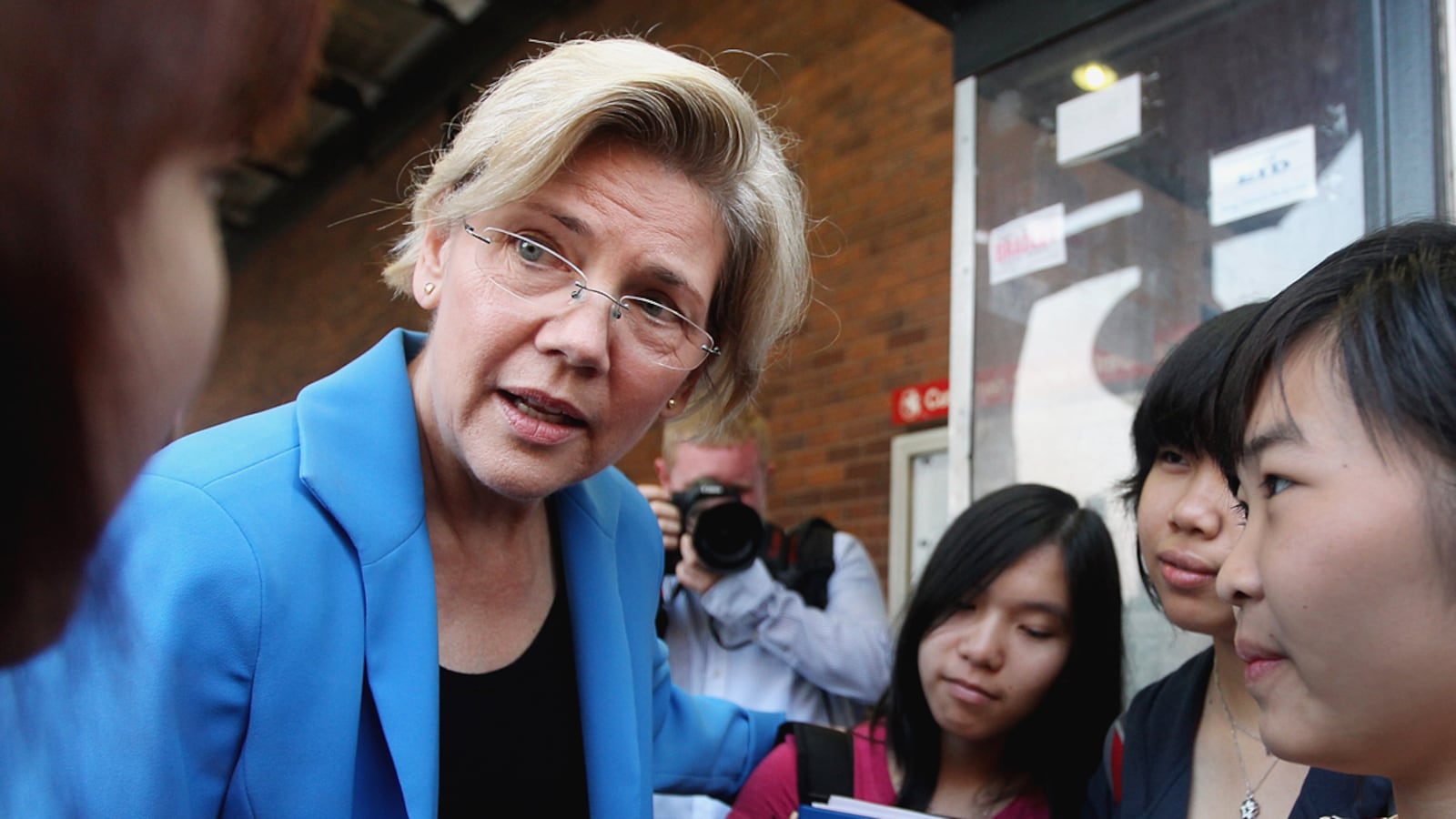Elizabeth Warren is running for office in the most high-profile race in the country not involving Barack Obama. It’s a position that calls for some tact. So what does she think about the Occupy Wall Street protests that are roiling the country?
“I created much of the intellectual foundation for what they do,” she says. “I support what they do.”
Warren’s boast isn’t bluster: As a professor of commercial law at Harvard and the force behind Obama’s consumer-protection bureau, Warren has been one of the most articulate voices challenging the excesses of Wall Street. Still, she enjoys an outsize celebrity for an academic and bureaucrat: a favorite guest of Jon Stewart, Warren, 62, has become a hero to the left, a villain to the right, and a fascination for everyone in between. Now that she is challenging Massachusetts Republican Sen. Scott Brown, she has emerged this year as a poster child for what some of America loves, and an increasing swath of America hates, about the president.
No one else has Warren’s gift to send the right into a sputtering frenzy.
She is, in the words of former Reagan operative Jeffrey Lord, “a guileless, fevered Marxist.” George Will put it more primly, but with the same sense of trepidation. Warren, he wrote, “clarifies the liberal project and the stakes of contemporary politics. The project is to dilute the concept of individualism.” Warren likely didn’t calm those fears by attending a fundraiser hosted by George Soros—the billionaire bogeyman of the right—in Manhattan last week.
Thanks to her service in Washington, overseeing money distributed to woozy banks and creating a consumer financial protection agency, Warren is feared as somebody out to soak the rich and redistribute wealth. But a look at her biography reveals that she’s not the hardened leftist some suspect. Here’s Warren’s challenge: Most first-time candidates for office struggle to create a compelling story about themselves. Warren has a different problem. She has to un-make one.

For all those quaking on the right at the sight of an ascendant Warren, rest easy. Warren’s no lefty. In fact, Warren was a registered Republican into her 40s. When it comes to ideology, Warren makes for a rotten heir to Kennedy.
“I was a Republican because I thought that those were the people who best supported markets. I think that is not true anymore,” Warren says. “I was a Republican at a time when I felt like there was a problem that the markets were under a lot more strain. It worried me whether or not the government played too activist a role.”
Did she vote for Ronald Reagan, who ushered in much of the financial deregulation which Warren has devoted her life to stopping? “I’m not going to talk about who I voted for,” she says.
It wasn’t until later in life, when Warren was 46, that she had her political awakening. At the time, she was serving on a committee recommending changes to the nation’s bankruptcy laws. Until then, Warren says, “I said, ‘No, no, no, not for me on the politics.' ”
Warren decided then, in 1995, she could no longer retreat into the ivory tower. “I can’t just leave this to people who are going to wreck the lives of millions of American families if they get the chance,” she says. “I waded in.”
Warren adds that she voted for both Republicans and Democrats and thought that neither party deserved to dominate. “There should be some Republicans and some Democrats,” she says. Brown’s campaign could make the same point. In a state dominated by Democrats, it might help to have a Republican providing some healthy opposition.
Warren’s political sympathies are as much a product of upbringing as anything else. Born on the worn-down side of Norman, Oklahoma, young Betsy Herring grew up in a home that clung to the bottom of the middle class. She had pluck, taking her babysitting earnings to pay for application fees to two colleges where she thought she might have a chance at a debating scholarship. At 19, Herring married NASA engineer Jim Warren, her childhood sweetheart. A decade later, she was a divorced, mother of two, starting out a career as a junior law professor in Houston.
Starting in 1979, Warren embarked on influential, decades-long research of what causes families to go bankrupt. By 1992, Harvard Law School asked her to join the faculty. At that time, only five of 60 tenured professors were women. Three years later, Warren agreed to teach there permanently. The offer was a rich one. In 1996, Warren was the third-highest compensated employee at the university. Warren and her husband now live in a $1.7 million Cambridge home. The candidate who is accused of instigating class warfare seems like she has stepped out of a Horatio Alger story.
Still, you don’t need to look at Warren’s biography to realize that conservatives’ fears are misplaced. Warren’s studies have centered on debt, in particular the stress that the modern workplace puts on families. In The Two-Income Trap, her 2003 book, Warren argued that two-income families are less financially secure than families with a single earner. “Her complaints on behalf of the middle class sound positively Nixonian,” Christopher Caldwell wrote this summer in the Weekly Standard (where "Nixonian" can be a compliment). Go ahead and find another Democrat, particularly one who makes liberals swoon, being called a “closet conservative” as a compliment.
For a proudly progressive state, Massachusetts has an embarrassing record of voting women into office. Only one of 10 members of the Massachusetts delegation in the House is a woman (and she was married to a U.S. senator). The commonwealth has never elected a woman governor or senator. It sits in the bottom half of states in terms of female representation in the state legislature. And then there was the epic 2010 flameout of Massachusetts Attorney General Martha Coakley, who lost Kennedy’s Senate seat to Brown.
“The word’s out: I’m a woman,” Warren says, “and I’m going to have trouble backing off on that. I am what I am. I’ll go out and talk to people about what’s happening to their families, and when I do that, I’m a mother. I’m a grandmother.” Visiting a toy store in Salem, Mass., earlier this month, Warren played up her femininity, gushing about her 11-month-old grandson, Atticus. “The hardest part of being around this kid,” she said, “is that he has the most delicious-looking toes.”
The collision of politics, gender, and sexuality can be a nasty one for female candidates. Just ask Hillary Clinton or Sarah Palin. Warren’s brother, David Herring, unprompted, told me, “She is not a lesbian. I think I read that. That was comical.” (Warren is married to Harvard Law professor Bruce Mann.) The example of a female authority figure still seems to scramble the male brain.
Warren’s looks are causing some men to pay extra attention—including Brown. When quizzed by a student at a candidates’ debate in early October about how she paid for college, Warren grinned and said, “I kept my clothes on.” Brown’s response? “Thank God.” Brown famously did take his clothes off to help pay his tuition, posing nude for Cosmopolitan in 1982. “She was joking. I was joking,” Brown later said. Not everyone is so disparaging. One man who Warren encountered in Salem asked why she hadn’t returned his email messages after an encounter on an airplane. “I was hitting on you,” the man clarified.
For fans, Warren’s charm offensive has risks too. They don’t want her to stop hitting back.
“Maybe she should kick more sand in their eyes,” says admirer Eliot Spitzer. “Maybe she should rough them up a little more.”






